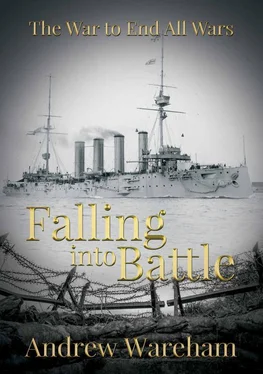“A seat in the Commons, I think, David. That can be arranged, I do not doubt, in a month or two.”
“The height of respectability. Which party, or does that not matter?”
“The difference between Liberal and Conservative is slight these days, my boy. Both are drawn from the right sort, with a few exceptions such as Lloyd George – and even he is no red revolutionary, though a little keen, shall we say, to tax the rich. I have no objections to paying my share – this country has been good to the family. Labour is not for us, as goes without saying, but they don’t count just now. No, I shall have a word with the party managers and pick up a nomination for the next bye-election and have you ushered in – they will not contest seats in wartime.”
There was a sigh of relief, the family secured whatever might happen. Sir David turned to Simon.
“I was talking to your Uncle Maurice Sturton this morning, young man – your father’s elder, only brother and heir to the title. Business initially, but I could hardly not mention your presence in my house; it would have been ill-mannered in the extreme. He had read the newspapers and assumed that the Lieutenant Sturton RN must be you. He sent his regards and good wishes; he does not share his father’s opinions that you must be shunned. Both his sons are in France, he tells me. Young men, much of an age with you, and neither married.”
Simon was not quite certain of the relevance of that last piece of information. Dacres nudged him and laughed.
“Two deaths away from being heir, Sturton! You may be Viscount Perceval yet.”
“One might hope not, Dacres. I would not wish that on any family.”
“Nor you should, but the possibility is there.”
Sir David gravely agreed.
“You may well find yourself inheriting, Sturton. Far less likely events occurred during the Boer War, and this looks as if it may be a comparable conflict.”
“Perhaps, sir, but I don’t think I shall take out, what do they call them, ‘post-obit’ bonds?”
There was a general laugh.
“Not a wise idea – loans to be repaid on one’s inheritance, and coming due if, by some mischance, one does not inherit! Not a thinking man’s way of financing himself. While I think of it, who are your trustees, Sturton? I might be able to put them onto a good thing or two.”
“Aitkens, Aitkens and Trim, sir.”
“Good firm! I will have a word with them, but I would be surprised if they were not as wide-awake to the markets as I am. Your funds are in good hands there, young man.”
Simon was not sure of the importance of that.
“They will have got out of Consols good and early and put your money into shares that are certain to grow. They won’t stick with Consols because they are ‘safe’, as some little country solicitor would. I would be surprised if you did not find your principal and its income to rise quite significantly over the next few months. Good thing, too! You risk your life for your country, you deserve to be rewarded.”
Simon was not sure of that logic but raised no objection.
They returned to Harwich next day and were immediately paraded before Commodore Tyrwhitt together with Parrett, Harker and Captain Smallwood.
“The Admiralty has signified its pleasure with Sheldrake , gentlemen, and quite rightly so! Captain Smallwood is awarded the DSO for his actions and the four of you besides each have a Mention in Despatches, which you may all be proud of. I am pleased indeed to be permitted to inform you of your decorations.”
Decorations were valuable for young men seeking to make careers. Their next promotion came much closer.
“ Sheldrake and her section will continue with coastal patrols for the next few weeks. It is likely that all of the H boats will be taken out with the L Class at some point, in the hope of bringing units of the High Seas Fleet to action in the southern North Sea. That is still in the planning stage. For the while, patrols must go out to protect the troopships crossing the Channel. We could lose the war if those ships are sunk. Four or five troopers lost would be the death of a brigade or more of infantry, and that must not happen! Your work is vital, gentlemen, and I am glad to know it is in such very good hands!”
“All very fine, gentlemen, but we must accept that H Class destroyers are not the ideal boats for the job. Some of the German destroyers mount four of five inch quick firers, together with Maxims and torpedo tubes, and can manage better than thirty knots. If we tangle with them, we may find ourselves in trouble, the more because we lack wireless to call for help.”
They had to agree with Captain Smallwood’s summation – not that they would have publicly disagreed, in any case.
“Mr Harker, what has been the word on your torpedoes?”
“The gyroscopes are to be remodelled, sir. There have been a number of complaints of failure. For the while, we should not attempt to maintain them aboard ship. We should return the torpedoes to the yard, sir, where specialist engineers will work on them. We must draw them whenever we tie up and have them taken in their cradles to the yard and bring back a new pair, freshly made ready for us. It is possible that the gyroscopes are too delicate, that prolonged bumping in the tubes may overset them, so they should be taken to sea for a minimum length of time.”
“That is ridiculous, Mr Harker! We are rarely two or three days at sea, but what of a cruiser which may be out for weeks at a time?”
“I did not ask, sir, and I doubt they would have answered, in any case.”
“Madness! Obey their instructions, Mr Harker. Do your best, as I know you will.”
They oiled and filled the magazines and made ready for sea. Autumn was coming and they had all picked up extra woolly sweaters and thick, high stockings.
Next morning, they sailed into a brisk westerly, wrapped themselves in oilskins and prepared to endure seventy-two hours at sea in rolling, pitching, cold and wet conditions, a foretaste of the North Sea at any time other than high summer.
“Stand-to, sir. Twenty minutes to first light, sir. Mug of char.”
“Thanks, Sergeant Grace. Too damned early for me – how do you manage to look so smart at this time of day?”
“Twenty years of service, sir. You will do the same when you’re colonel, sir - if you don’t make general before you’ve done twenty, that is.”
“Not me, Sergeant. Be lucky to make captain.”
“Beg pardon, sir, but you’re likely to be a captain in the next couple of weeks, the way things are going!”
Richard said nothing to that.
Grace had the experience, the knowledge of minor campaigns in India and Africa and two years of the Boer War. If he felt that things were going wrong, then he was likely to be right.
“God! This is awful tea, Grace!”
“Put hairs on your chest, sir. It’s got to be good for something. It’s hot and wet, sir – don’t claim to be much else.”
“It wakes a man up, that’s for sure. Are the men all at their firing points, Sergeant?”
“All there, sir, except for the ones what’s acting as cooks. Breakfast coming, sir. The platoon cooks carried a few pounds of bacon, sir, and some bread in their packs what has gone stale. Making bacon sarnies, sir, in toast. Over an open fire, so the toast’s a bit on the black side, but it will put something hot and solid in their bellies. Cooks got up an hour early, sir.”
“That was well done of them – showed very willing. Is there some way we can look after them, Sergeant?”
“When we get back to barracks, sir, or to a camp. I’ll see to that.”
“Good. Tell them how pleased I am. I’d better have a look round. Show my face, let them see I’m awake too.”
Читать дальше












